Boyle J.A. The Cambridge History of Iran, Volume 5: The Saljuq and Mongol Periods
Подождите немного. Документ загружается.

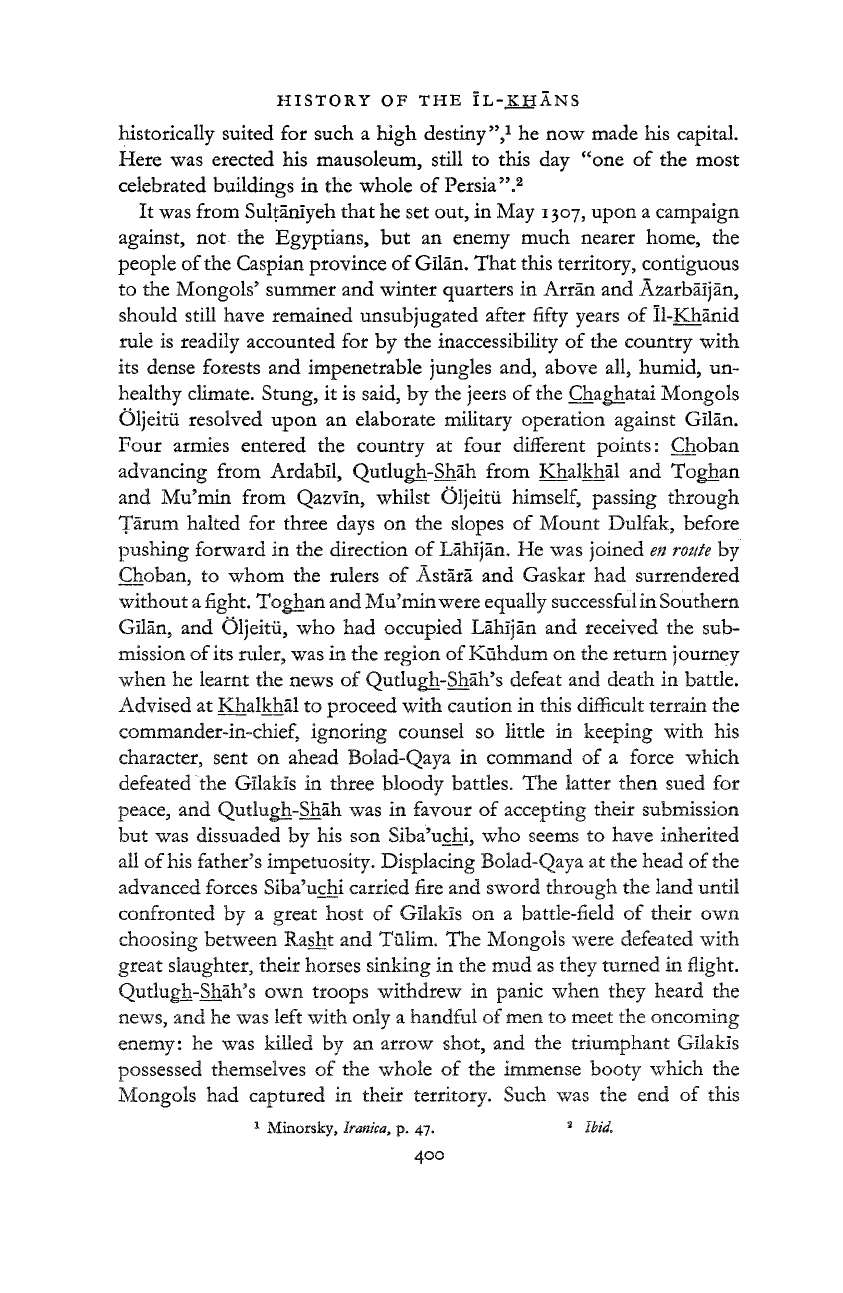
HISTORY OF THE ÎL-KJIÂNS
historically suited for such a high destiny'V he now made his capital.
Here was erected his mausoleum, still to this day "one of the most
celebrated buildings in the whole of Persia".
2
It was from Sultâniyeh that he set out, in May
1307,
upon a campaign
against, not the Egyptians, but an enemy much nearer home, the
people of the Caspian province of Gilân. That this territory, contiguous
to the Mongols' summer and winter quarters in
Arrân and Âzarbâijân,
should still have remained unsubjugated after fifty years of Il-Khânid
rule is readily accounted for by the inaccessibility of the country with
its dense forests and impenetrable jungles and, above all, humid, un-
healthy climate. Stung, it is said, by the jeers of the Chaghatai Mongols
Öljeitü resolved upon an elaborate military operation against Gilân.
Four armies entered the country at four different points: Choban
advancing from Ardabil, Qutlugh-Shah from Khalkhâl and Toghan
and Mu'min from Qazvin, whilst Öljeitü himself, passing through
Târum halted for three days on the slopes of Mount Dulfak, before
pushing forward in the direction of
Lâhijân. He was joined en route by
Choban, to whom the rulers of Âstârâ and Gaskar had surrendered
without a fight. Toghan and Mu'min were equally successful in Southern
Gilân, and Öljeitü, who had occupied Lâhijân and received the sub-
mission of its ruler, was in the region of Kühdum on the return journey
when he learnt the news of Qutlugh-Shah's defeat and death in battle.
Advised at
Khalkhâl to proceed with caution in this difficult terrain the
commander-in-chief, ignoring counsel so little in keeping with his
character, sent on ahead Bolad-Qaya in command of a force which
defeated the Gilakis in three bloody battles. The latter then sued for
peace,
and Qutlugh-Shah was in favour of accepting their submission
but was dissuaded by his son Siba'uchi, who seems to have inherited
all of his father's impetuosity. Displacing Bolad-Qaya at the head of the
advanced forces Siba'uchi carried fire and sword through the land until
confronted by a great host of Gilakis on a battle-field of their own
choosing between Rasht and
Tülim. The Mongols were defeated with
great slaughter, their horses sinking in the mud as they turned in flight.
Qutlugh-Shah's own troops withdrew in panic when they heard the
news, and he was left with only a handful of men to meet the oncoming
enemy: he was killed by an arrow shot, and the triumphant Gilakis
possessed themselves of the whole of the immense booty which the
Mongols had captured in their territory. Such was the end of this
1
Minorsky, Iranica, p. 47.
2
Ibid.
400
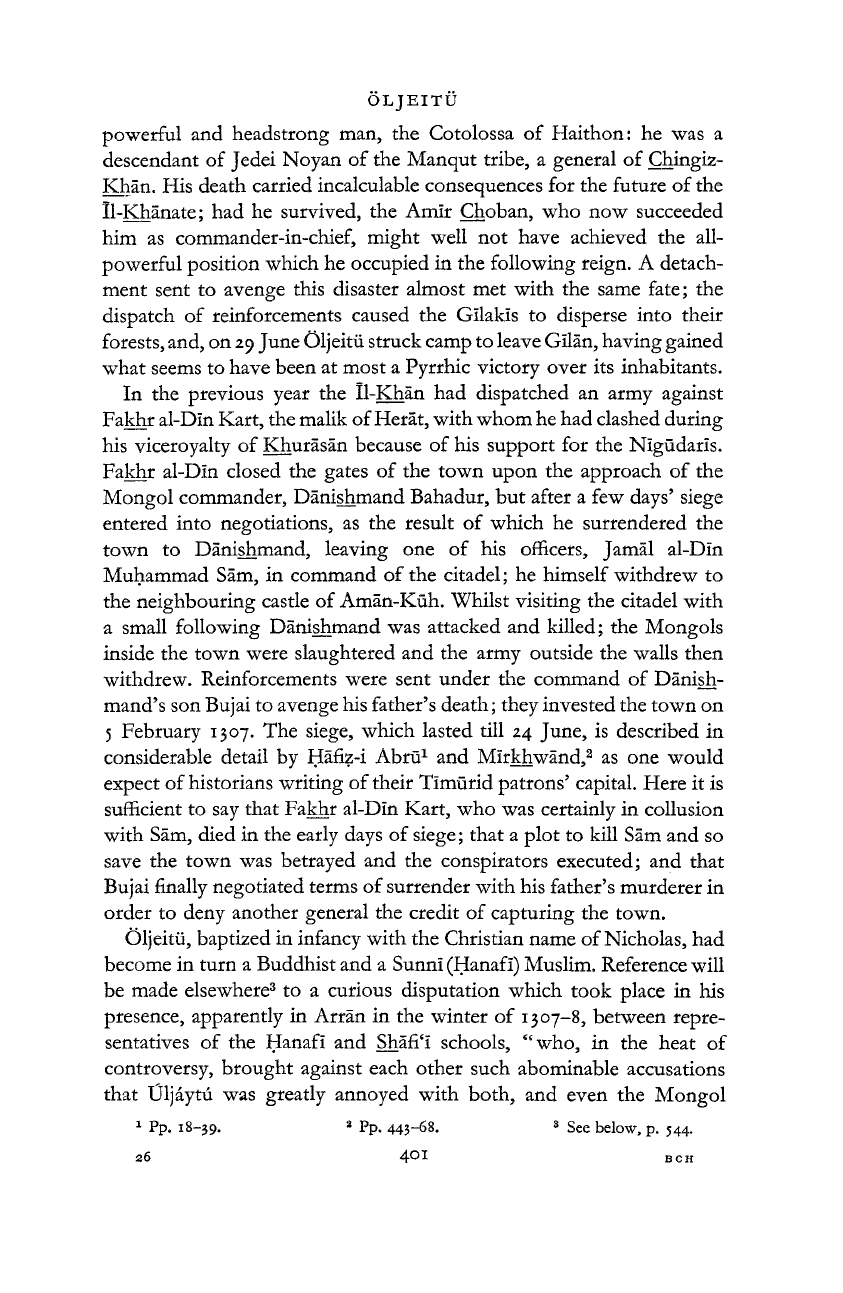
OLJEITU
powerful
and headstrong man, the Cotolossa of Haithon: he was a
descendant of Jedei Noyan of the Manqut tribe, a general of
Chingiz-
Khan.
His death carried incalculable consequences for the future of the
Il-Khanate; had he survived, the Amir Choban, who now succeeded
him as commander-in-chief, might
well
not have achieved the all-
powerful
position which he occupied in the following reign. A detach-
ment sent to avenge this disaster almost met with the same fate; the
dispatch of reinforcements caused the Gilakis to disperse into their
forests,
and, on 29
June
Oljeitu struck camp to
leave
Gilan,
having gained
what seems to have been at most a Pyrrhic victory over its inhabitants.
In the previous year the Il-Khan had dispatched an army against
Fakhr al-Din Kart, the malik
of
Herat, with whom he had clashed during
his viceroyalty of Khurasan because of his support for the Nigudaris.
Fakhr al-Din closed the gates of the town upon the approach of the
Mongol
commander, Danishmand Bahadur, but after a few days' siege
entered into negotiations, as the result of which he surrendered the
town
to Danishmand, leaving one of his officers,
Jamal
al-Din
Muhammad Sam, in command of the citadel; he himself withdrew to
the neighbouring castle of
Aman-Kuh.
Whilst visiting the citadel with
a small following Danishmand was attacked and killed; the Mongols
inside the town were slaughtered and the army outside the walls
then
withdrew. Reinforcements were sent
under
the command of Danish-
mand's son Bujai to avenge his father's death; they invested the town on
5 February 1307. The siege, which lasted till 24
June,
is described in
considerable detail by Hafiz-i Abru
1
and Mirkhwand,
2
as one would
expect
of historians writing of their Timurid patrons' capital. Here it is
sufficient
to say
that
Fakhr al-Din Kart, who was certainly in collusion
with
Sam, died in the early days of
siege;
that
a plot to
kill
Sam and so
save
the town was betrayed and the conspirators executed; and
that
Bujai
finally negotiated
terms
of
surrender
with his father's
murderer
in
order to deny
another
general the credit of capturing the town.
Oljeitu,
baptized in infancy with the Christian name of
Nicholas,
had
become
in
turn
a Buddhist and a Sunni (Hanafi) Muslim. Reference
will
be made elsewhere
3
to a curious disputation which took place in his
presence, apparently in Arran in the winter of 1307-8, between repre-
sentatives of the Hanafi and Shafi'I schools, "
who,
in the heat of
controversy,
brought against each other such abominable accusations
that
tJljaytu was greatly annoyed with both, and even the Mongol
1
Pp.
18-39.
2
Pp. 443-68.
8
See below, p. 544.
26
4
01
BCH
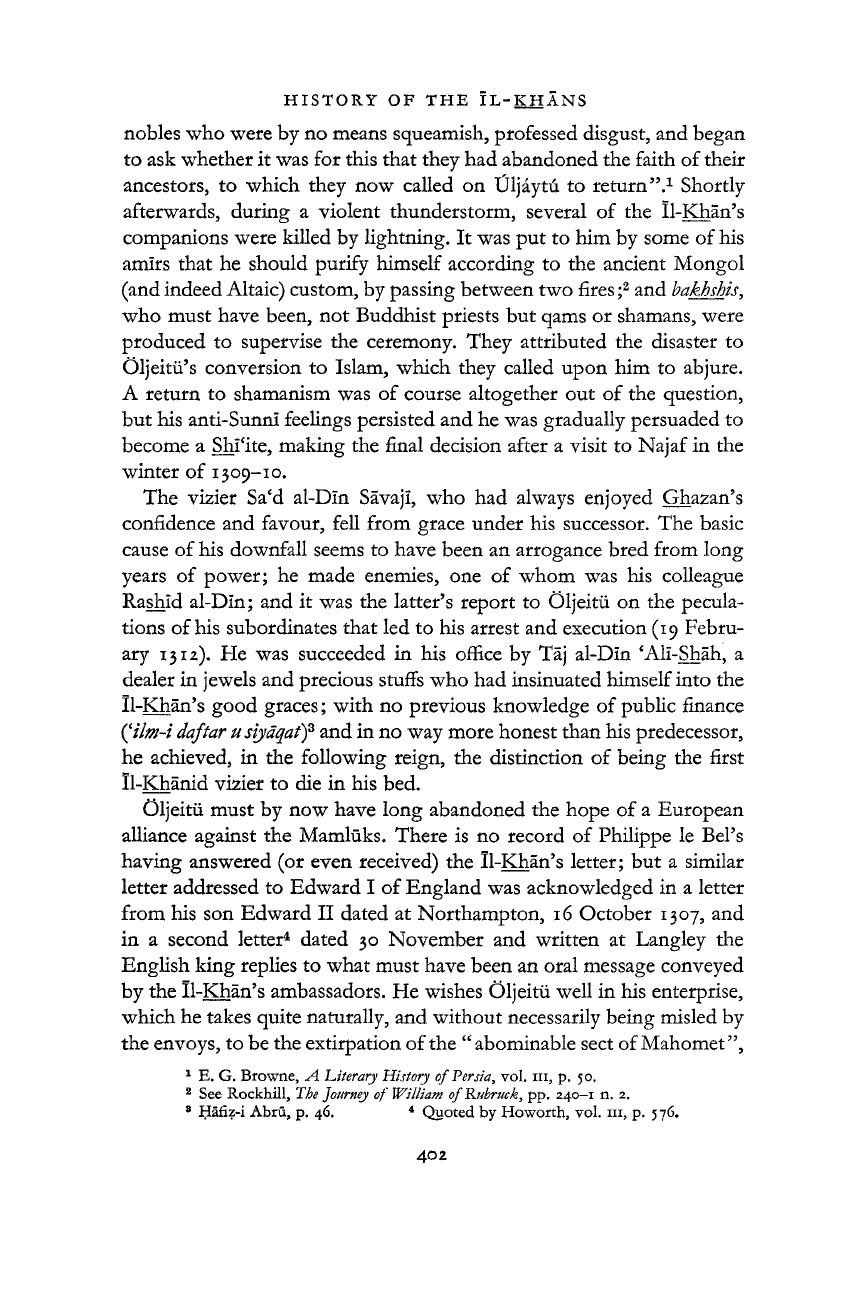
HISTORY
OF THE
IL-KHANS
nobles who were by no means squeamish, professed disgust, and began
to ask whether it was for this
that
they had abandoned the faith of their
ancestors, to which they now called on tJljaytu to
return".
1
Shortly
afterwards, during a violent
thunderstorm,
several of the Il-Khan's
companions were killed by lightning. It was put to him by some of his
amirs
that
he should purify himself according to the ancient Mongol
(and indeed
Altaic)
custom, by passing between two fires ;
2
and bakbshis,
who
must have been, not Buddhist priests but qams or shamans, were
produced to supervise the ceremony. They
attributed
the disaster to
Oljeitii's
conversion to Islam, which they called upon him to abjure.
A
return
to shamanism was of course altogether out of the question,
but his anti-Sunni feelings persisted and he was gradually persuaded to
become a Shi'ite, making the final decision after a visit to Najaf in the
winter of 1309-10.
The
vizier Sa'd al-Din Savaji, who had always enjoyed Ghazan's
confidence
and favour,
fell
from grace
under
his successor. The basic
cause of his downfall seems to have been an arrogance bred from long
years of power; he made enemies, one of whom was his colleague
Rashid al-Din; and it was the latter's report to Oljeitu on the pecula-
tions of his subordinates
that
led to his
arrest
and execution (19 Febru-
ary
1312).
He was succeeded in his
office
by Taj al-Din 'All-Shah, a
dealer in jewels and precious stuffs who had insinuated himself into the
Il-Khan's good graces; with no previous knowledge of public finance
^ilm4
daftar
u siydqaff and in no way more honest
than
his predecessor,
he achieved, in the following reign, the distinction of being the first
Il-Khanid vizier to die in his bed.
Oljeitu
must by now have long abandoned the hope of a European
alliance against the Mamluks. There is no record of Philippe le
Bel's
having
answered (or even received) the Il-Khan's letter; but a similar
letter addressed to Edward I of England was acknowledged in a letter
from his son Edward II dated at Northampton, 16 October 1307, and
in a second letter
4
dated 30 November and written at Langley the
English
king replies to what must have been an oral message conveyed
by
the Il-Khan's ambassadors. He wishes Oljeitu
well
in his enterprise,
which
he takes quite naturally, and without necessarily being misled by
the
envoys,
to be the extirpation of the "abominable sect
of
Mahomet",
1
E. G. Browne, A Literary History of
Persia,
vol. in, p. 50.
2
See Rockhill, The
Journey
of William of Rubruck, pp. 240-1 n. 2.
8
I^aflz-i Abru, p. 46.
4
Quoted by Howorth, vol. in, p. 576.
402
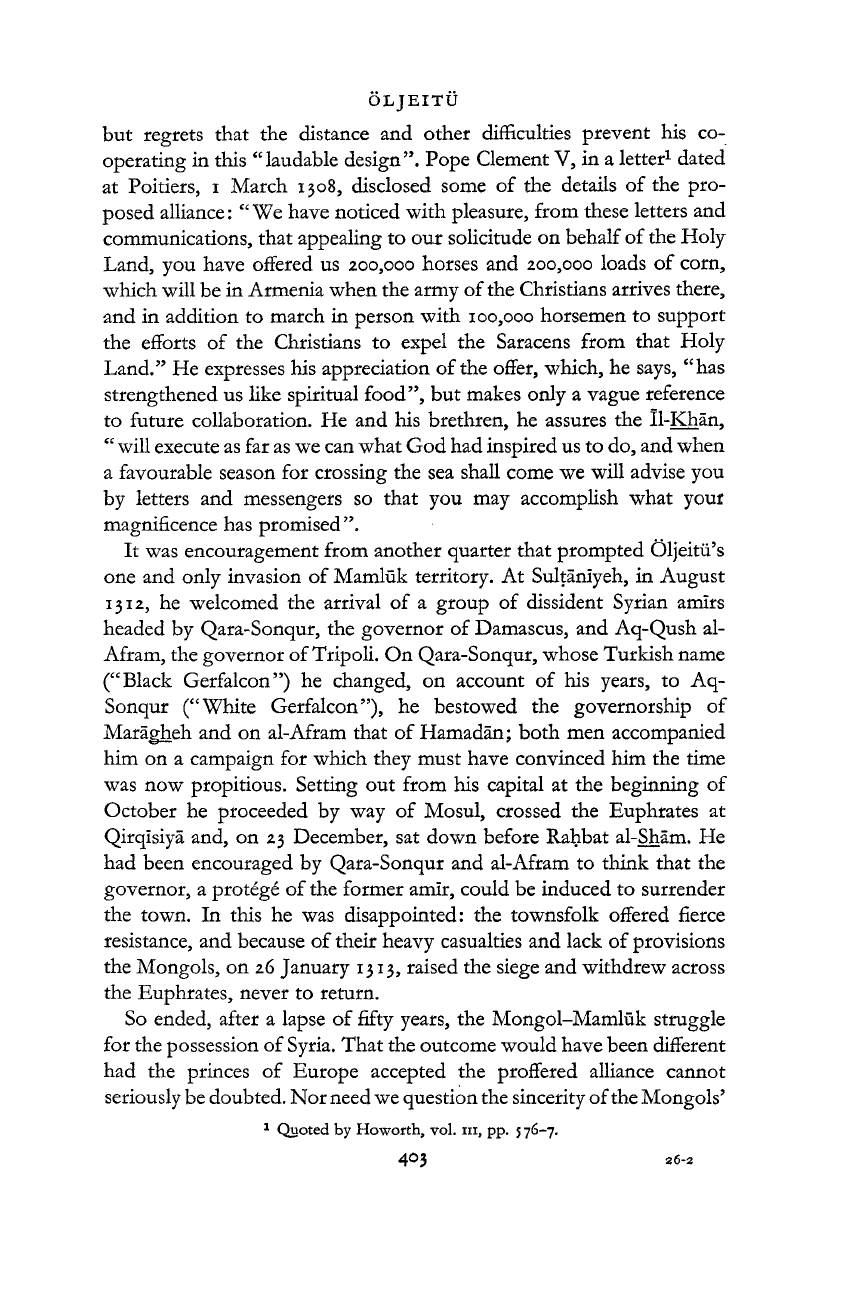
OLJEITU
but regrets
that
the distance and other difficulties prevent his co-
operating in this "laudable design". Pope Clement V, in a letter
1
dated
at Poitiers, i March 1308, disclosed some of the details of the pro-
posed alliance: "We have noticed with pleasure, from these letters and
communications,
that
appealing to our solicitude on behalf of the Holy-
Land, you have offered us
200,000
horses and
200,000
loads of corn,
which
will
be in Armenia when the army of the Christians arrives there,
and in addition to march in person with
100,000
horsemen to support
the efforts of the Christians to expel the Saracens from
that
Holy
Land." He expresses his appreciation of the offer, which, he says, "has
strengthened us like spiritual food", but makes only a vague reference
to future collaboration. He and his
brethren,
he assures the Il-Khan,
"
will
execute as far as we can what God had inspired us to do, and when
a favourable season for crossing the sea shall come we
will
advise you
by
letters and messengers so
that
you may accomplish what your
magnificence
has promised ".
It was encouragement from
another
quarter
that
prompted Oljeitu's
one and only invasion of Mamluk territory. At Sultaniyeh, in August
1312,
he welcomed the arrival of a group of dissident Syrian amirs
headed by Qara-Sonqur, the governor of Damascus, and Aq-Qush al-
Afram,
the governor of
Tripoli.
On Qara-Sonqur, whose Turkish name
("Black
Gerfalcon") he changed, on account of his years, to Aq-
Sonqur ("White Gerfalcon"), he bestowed the governorship of
Maragheh and on al-Afram
that
of Hamadan; both men accompanied
him on a campaign for which they must have convinced him the time
was
now propitious. Setting out from his capital at the beginning of
October he proceeded by way of Mosul, crossed the Euphrates at
Qirqisiya
and, on 23 December, sat down before Rahbat al-Sham. He
had been encouraged by Qara-Sonqur and al-Afram to think
that
the
governor, a protege of the former amir, could be induced to
surrender
the town. In this he was disappointed: the townsfolk offered fierce
resistance, and because of their heavy casualties and lack of provisions
the Mongols, on 26
January
1313,
raised the siege and withdrew across
the Euphrates, never to
return.
So
ended, after a lapse of
fifty
years, the Mongol-Mamluk struggle
for
the possession of
Syria.
That the outcome would have been different
had the princes of Europe accepted the proffered alliance cannot
seriously be doubted. Nor need we question the sincerity
of
the Mongols'
1
Quoted by Howorth, vol. in, pp.
5
76-7.
4°3
26-2
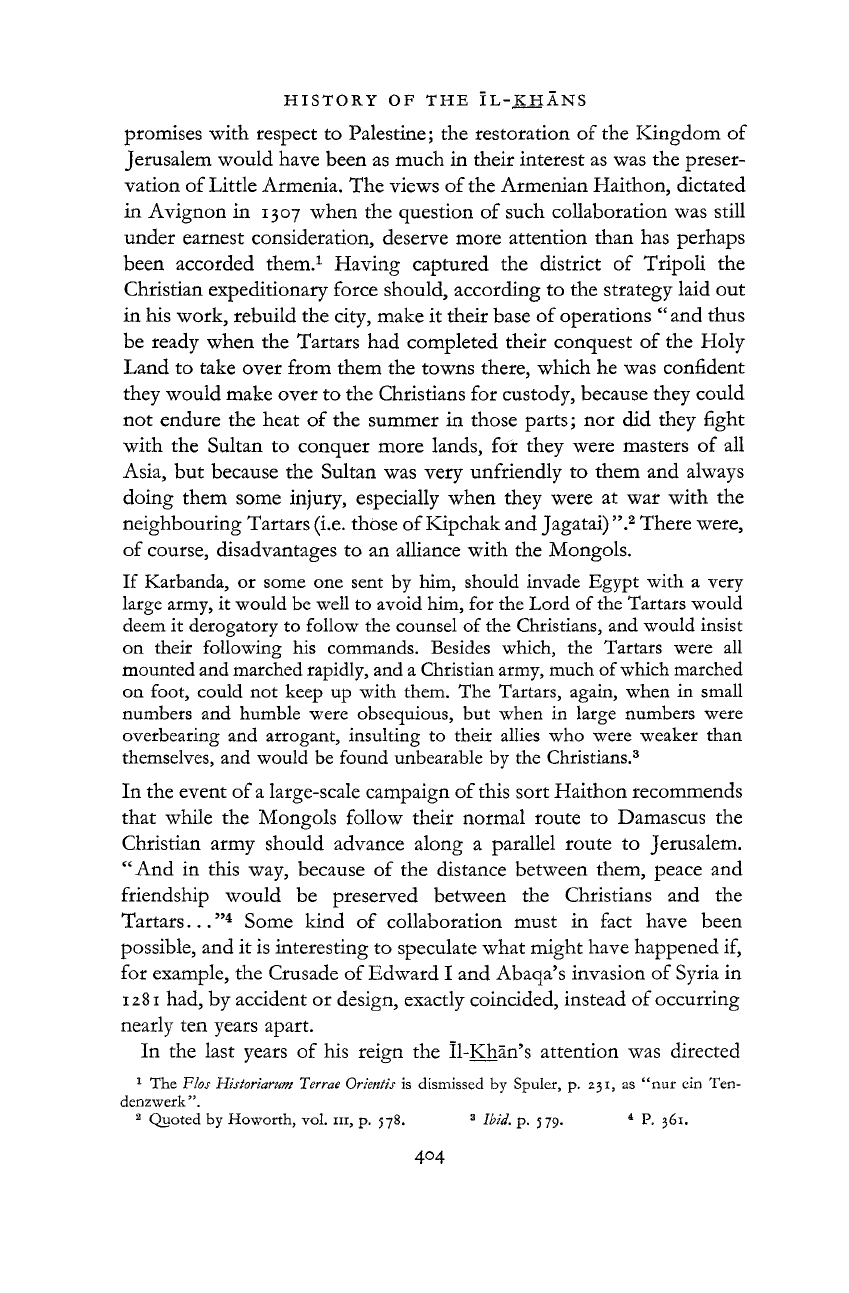
HISTORY
OF THE
"iL-KHANS
promises with respect to Palestine; the restoration of the Kingdom of
Jerusalem would have been as much in their interest as was the preser-
vation of Little Armenia. The
views
of the Armenian Haithon, dictated
in
Avignon
in 1307 when the question of such collaboration was still
under
earnest consideration, deserve more
attention
than
has perhaps
been accorded them.
1
Having captured the district of Tripoli the
Christian expeditionary force should, according to the strategy laid out
in his work, rebuild the city, make it their base of operations "and
thus
be ready when the Tartars had completed their conquest of the Holy
Land to take over from them the towns there, which he was confident
they would make over to the Christians for custody, because they could
not
endure
the heat of the summer in those parts; nor did they fight
with
the Sultan to conquer more lands, for they were masters of all
Asia,
but because the Sultan was very unfriendly to them and always
doing them some injury, especially when they were at war with the
neighbouring Tartars (i.e. those of Kipchak and Jagatai) ".
2
There were,
of
course, disadvantages to an alliance with the Mongols.
If
Karbanda, or some one sent by him, should invade Egypt with a very
large army, it would be
well
to avoid him, for the Lord of the Tartars would
deem it derogatory to
follow
the counsel of the Christians, and would insist
on their
following
his commands. Besides which, the Tartars were all
mounted and marched rapidly, and a Christian army, much of
which
marched
on foot, could not keep up with them. The Tartars, again, when in small
numbers and humble were obsequious, but when in large numbers were
overbearing and arrogant, insulting to their allies who were weaker
than
themselves, and would be found unbearable by the Christians.
3
In the event of a large-scale campaign of this sort Haithon recommends
that
while the Mongols
follow
their normal
route
to Damascus the
Christian army should advance along a parallel
route
to Jerusalem.
"And
in this way, because of the distance between them, peace and
friendship would be preserved between the Christians and the
Tartars... "
4
Some kind of collaboration must in fact have been
possible,
and it is interesting to speculate what might have happened if,
for
example, the Crusade of Edward I and Abaqa's invasion of Syria in
1281
had, by accident or design, exactly coincided, instead of occurring
nearly ten years
apart.
In the last years of his reign the Il-Khan's
attention
was directed
1
The
Flos
Historiarum Terras Orientis is dismissed by Spuler, p. 231, as "nur ein Ten-
denzwerk
".
2
Quoted by Howorth, vol. in, p. 578.
3
Ibid. p.
5
79.
4
P. 361.
404
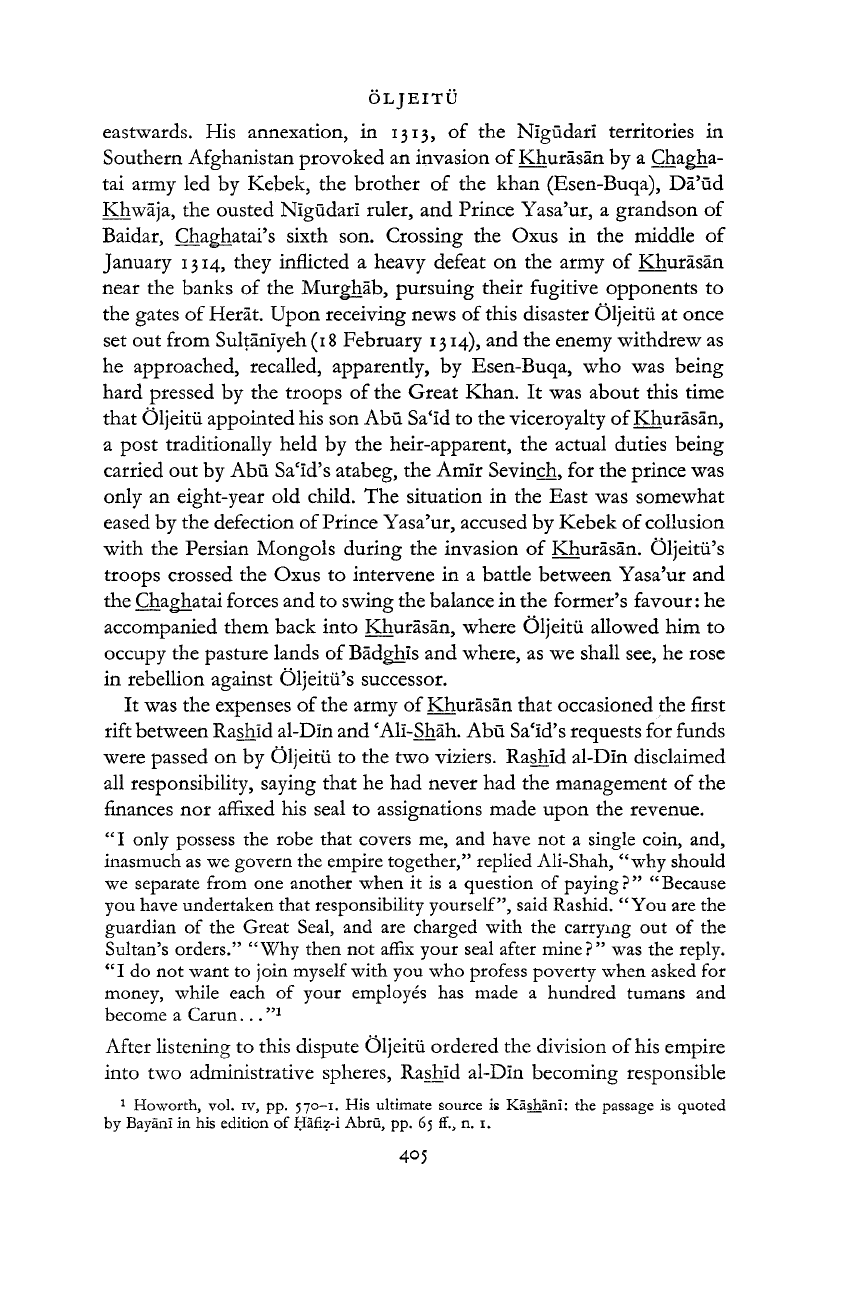
OLJEITU
405
eastwards. His annexation, in 1313, of the Nigudari territories in
Southern Afghanistan provoked an invasion of Khurasan by a Chagha-
tai army led by Kebek, the
brother
of the khan (Esen-Buqa), Da'ud
Khwaja,
the ousted Nigudari ruler, and Prince Yasa'ur, a grandson of
Baidar, Chaghatai's sixth son. Crossing the Oxus in the middle of
January
1314, they inflicted a heavy defeat on the army of Khurasan
near
the banks of the Murghab, pursuing their fugitive opponents to
the gates of Herat. Upon receiving news of this disaster Oljeitu at once
set out from Sultaniyeh
(18
February
1314),
and the enemy withdrew as
he approached, recalled, apparently, by Esen-Buqa, who was being
hard
pressed by the troops of the Great Khan. It was about this time
that
Oljeitu appointed his son Abu Sa'id to the viceroyalty
of
Khurasan,
a post traditionally held by the
heir-apparent,
the actual duties being
carried out by Abu Sa'id's atabeg, the Amir Sevinch, for the prince was
only
an eight-year old child. The situation in the East was somewhat
eased by the defection of Prince Yasa'ur, accused by Kebek of collusion
with
the Persian Mongols during the invasion of Khurasan. Oljeitu's
troops crossed the Oxus to intervene in a battle between Yasa'ur and
the Chaghatai forces and to swing the balance in the former's favour: he
accompanied them back into Khurasan, where Oljeitu allowed him to
occupy
the
pasture
lands of Badghis and where, as we shall see, he rose
in rebellion against Oljeitu's successor.
It was the expenses of the army of Khurasan
that
occasioned the first
rift between Rashid al-Din and
'Ali-Shah.
Abu Sa
c
id's requests for funds
were passed on by Oljeitu to the two viziers. Rashid al-Din disclaimed
all
responsibility, saying
that
he had never had the management of the
finances nor affixed his seal to assignations made upon the revenue.
"I only possess the robe
that
covers me, and have not a single coin, and,
inasmuch as we govern the empire together," replied
Ali-Shah,
"why should
we
separate from one
another
when it is a question of paying?" "Because
you
have undertaken
that
responsibility yourself", said Rashid.
"You
are the
guardian of the Great
Seal,
and are charged with the carrying out of the
Sultan's orders." "Why
then
not
affix
your seal after mine?" was the reply.
"I do not want to join myself with you who profess poverty when asked for
money, while each of your employes has made a
hundred
tumans
and
become a Carun... "
J
After
listening to this dispute Oljeitu ordered the division
of
his empire
into two administrative spheres, Rashid al-Din becoming responsible
1
Howorth, vol. iv, pp.
570-1.
His ultimate source is Kashani: the passage is quoted
by
Bayani in his edition of Hafiz-i Abru, pp. 65 ff., n. 1.
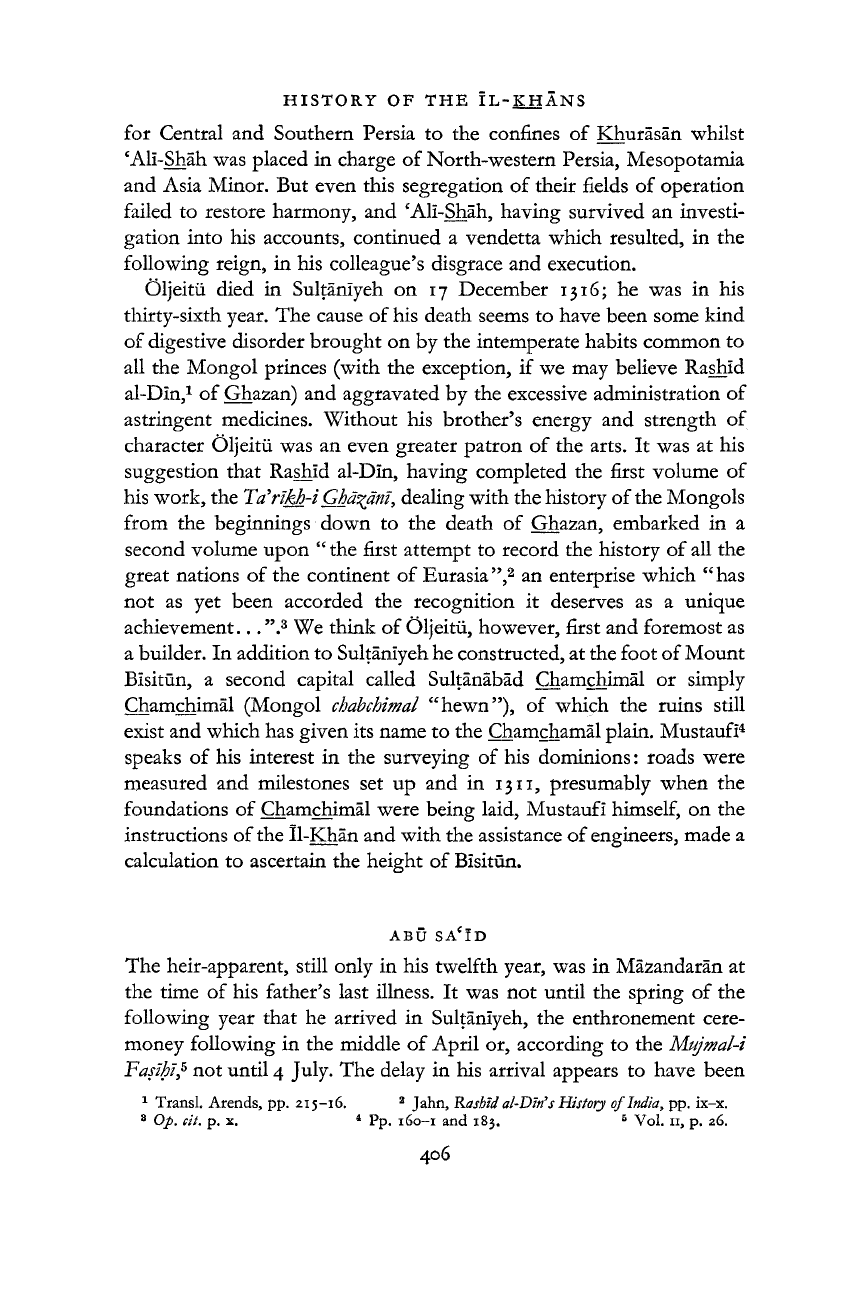
HISTORY
OF THE
IL-KHANS
ABU SA
C
ID
The heir-apparent, still only in his twelfth year, was in Mazandaran at
the time of his father's last illness. It was not until the spring of the
following
year
that
he arrived in Sultaniyeh, the enthronement cere-
money following in the middle of April or, according to the Mujmal-i
Faszhi? not until 4 July. The delay in his arrival appears to have been
1
Transl. Arends, pp.
215-16.
2
Jahn,
Rashid al-Dirfs History
of
India, pp. ix-x.
8
Op. cit. p. x.
4
Pp. 160-1 and 183.
s
Vol.
11,
p. 26.
406
for
Central and Southern Persia to the confines of Khurasan whilst
c
Ali-Shah
was placed in charge of North-western Persia, Mesopotamia
and
Asia
Minor. But even this segregation of their fields of operation
failed
to restore harmony, and
c
Ali-Shah, having survived an investi-
gation into his accounts, continued a vendetta which resulted, in the
following
reign, in his colleague's disgrace and execution.
Oljeitu
died in Sultaniyeh on 17 December 1316; he was in his
thirty-sixth year. The cause of his death seems to have been some kind
of
digestive disorder brought on by the intemperate habits common to
all
the Mongol princes (with the exception, if we may believe Rashid
al-Din,
1
of Ghazan) and aggravated by the excessive administration of
astringent medicines. Without his brother's energy and strength of
character Oljeitu was an even greater
patron
of the arts. It was at his
suggestion
that
Rashid al-Din, having completed the first volume of
his work, the Ta'rikh-i Gha^anu dealing with the history of the Mongols
from the beginnings down to the death of Ghazan, embarked in a
second volume upon " the first
attempt
to record the history of all the
great nations of the continent of Eurasia",
2
an enterprise which "has
not as yet been accorded the recognition it deserves as a unique
achievement.. .".
3
We think of Oljeitu, however, first and foremost as
a builder. In addition to Sultaniyeh he constructed, at the foot of Mount
Bisitun, a second capital called Sultanabad Chamchimal or simply
Chamchimal (Mongol chabchimal "hewn"), of which the
ruins
still
exist
and which has given its name to the Chamchamal plain. Mustaufi
4
speaks of his interest in the surveying of his dominions: roads were
measured and milestones set up and in
1311,
presumably when the
foundations of Chamchimal were being laid, Mustaufi himself, on the
instructions of the Il-Khan and with the assistance of engineers, made a
calculation to ascertain the height of Bisitun.

ABÜ
SA
4
ÍD
407
due to the ambition
of
his atabeg the Amir
Sevinch,
who for a while had
aspired to the post of amir of the ulus or commander-in-chief before
conceding
the superior claims of the Amir Choban, who had occupied
this
office
ever since the death of Qutlugh-Shah and to whose charge
Oljeitü,
upon his deathbed, had specifically committed his son.
The
new Il-Khan retained the services not only of Choban but also of
Rashid al-Din and
'Ali-Sháh.
The two viziers were still at loggerheads,
and
'Ali-Sháh,
jealous of the credit his colleague enjoyed with the now
all-powerful
amir of the ulus, renewed his former intrigues to such
purpose
that,
at the beginning of October 1317, Rashid al-Din was
dismissed from
office.
The Amir Sevinch wished to secure his reinstate-
ment, but died near Baghdad, where
Abü Sa'id was passing the winter
of 1317-18,
before he could achieve his object. In the spring, when the
Court
moved northwards, the Amir Choban summoned Rashid al-Din
from
Tabriz, where he was living in retirement and persuaded him,
against his better judgment, to
re-enter
the Il-Khán's service: he was,
Choban
said, as necessary to the
state
as salt to food.
'
All-Shah
and his
henchmen now redoubled their efforts to discredit him; they accused
him
of
having
poisoned the Il-Khan's father; the accusation was believed
and Choban, far from defending his protege, seems actually to have
assumed the role of prosecutor. Rashid al-Din was put to death on
17
July
1318,
having first been made to witness the execution of his son,
a lad of sixteen, who, as the cupbearer, was alleged to have actually
administered the poison. His death was the signal for the looting of
Rub
c
-i
Rashidi, the suburb of Tabriz which he had founded and given
his name, and all his lands and property were confiscated by the
Diván,
even
his pious foundations
(yaqfs)
being robbed of their endowments.
His severed head, according to Nuwairi,
1
was taken to Tabriz and
carried about the town for several days with cries of: " This is the head
of
the Jew who abused the name of God; may God's curse be upon
him!" Such was the ignominious end of the celebrated statesman and
historian, "the greatest vizier of the Il-Khan dynasty, and one of the
greatest men the East has produced";
2
he was a little over seventy years
of
age. His Jewish origin, denied by some scholars and queried by
others, has been fully established by the researches of Fischei
3
and
Spuler.
4
1
Quoted by d'Ohsson, vol. iv, p.
611.
2
Howorth, vol.
111,
p. 589.
3
See "Azarbaijan in Jewish History", pp.
15-18.
4
See Die
Mongolen
in
Iran,
pp. 247-9.
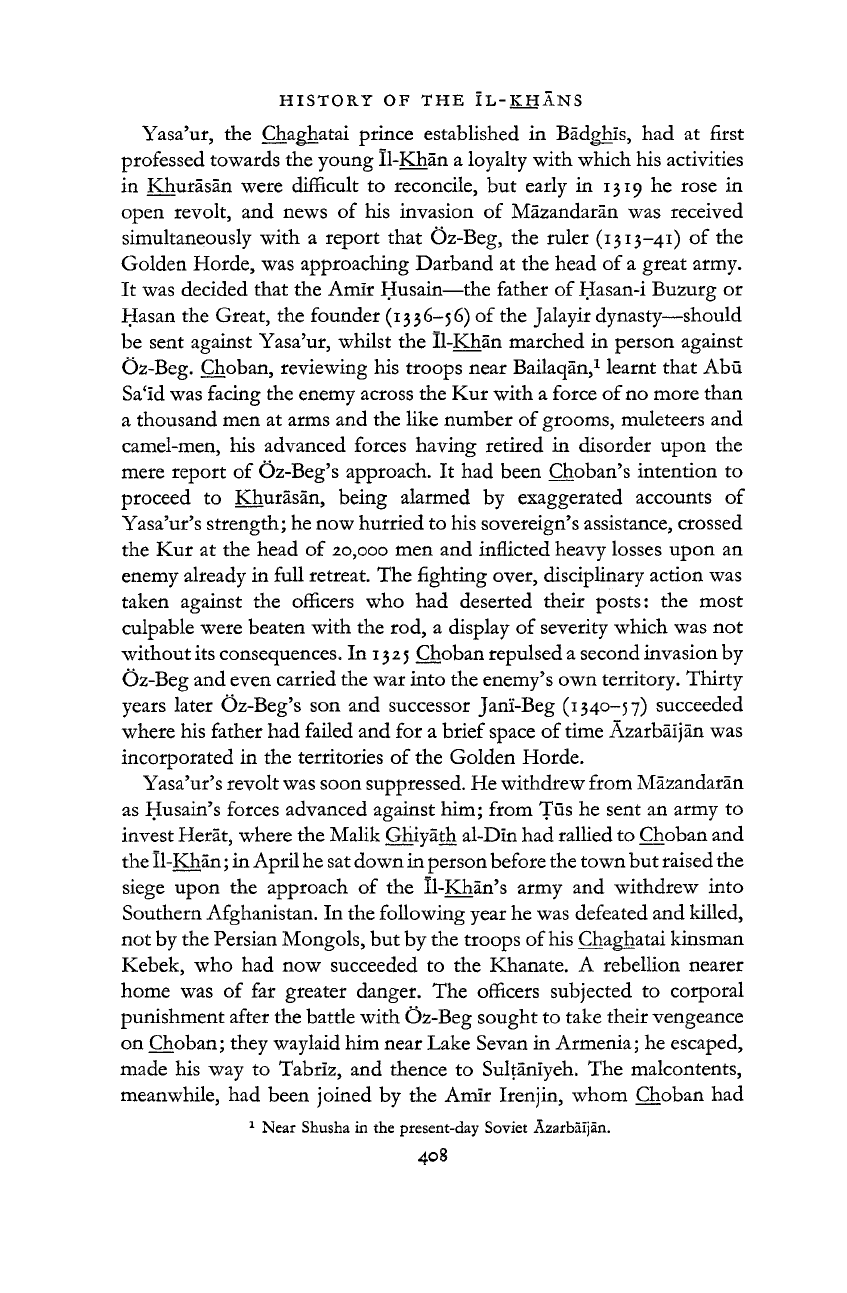
HISTORY
OF THE
IL-KHANS
Yasa'ur,
the Chaghatai prince established in Badghis, had at first
professed towards the young ll-Khan a loyalty with which his activities
in Khurasan were difficult to reconcile, but early in 1319 he rose in
open revolt, and news of his invasion of Mazandaran was received
simultaneously with a report
that
Oz-Beg,
the ruler
(1313-41)
of the
Golden
Horde, was approaching Darband at the head of a great army.
It was decided
that
the Amir Husain—the father of Hasan-i Buzurg or
Hasan the Great, the founder (1336-56) of the Jalayir dynasty—should
be sent against Yasa'ur, whilst the Il-Khan marched in person against
Oz-Beg.
Choban, reviewing his troops near Bailaqan,
1
learnt
that
Abu
Sa'id
was facing the enemy across the Kur with a force of no more
than
a thousand men at arms and the like number of grooms, muleteers and
camel-men, his advanced forces having retired in disorder upon the
mere report of
Oz-Beg's
approach. It had been Choban's intention to
proceed to Khurasan, being alarmed by exaggerated accounts of
Yasa'ur's
strength; he now hurried to his sovereign's assistance, crossed
the Kur at the head of
20,000
men and inflicted heavy losses upon an
enemy already in full
retreat.
The fighting over, disciplinary action was
taken against the officers who had deserted their posts: the most
culpable were beaten with the rod, a display of severity which was not
without its consequences. In 1325 Choban repulsed a second invasion by
Oz-Beg
and even carried the war into the enemy's own territory. Thirty
years later
Oz-Beg's
son and successor Jani-Beg (1340-57) succeeded
where his father had failed and for a brief space of time Azarbaijan was
incorporated in the territories of the Golden Horde.
Yasa'ur's
revolt was soon suppressed. He withdrew from Mazandaran
as Husain's forces advanced against him; from Tus he sent an army to
invest Herat, where the Malik Ghiyath al-Din had rallied to Choban and
the Il-Khan; in
April
he sat down in person before the town but raised the
siege
upon the approach of the Il-Khan's army and withdrew into
Southern Afghanistan. In the following year he was defeated and killed,
not by the Persian Mongols, but by the troops
of
his Chaghatai kinsman
Kebek,
who had now succeeded to the Khanate. A rebellion nearer
home was of far greater danger. The officers subjected to corporal
punishment after the battle with
Oz-Beg
sought to take their vengeance
on Choban; they waylaid him near Lake Sevan in Armenia; he escaped,
made his way to Tabriz, and thence to Sultaniyeh. The malcontents,
meanwhile, had been joined by the Amir Irenjin, whom Choban had
1
Near Shusha in the present-day Soviet Azarbaijan.
408
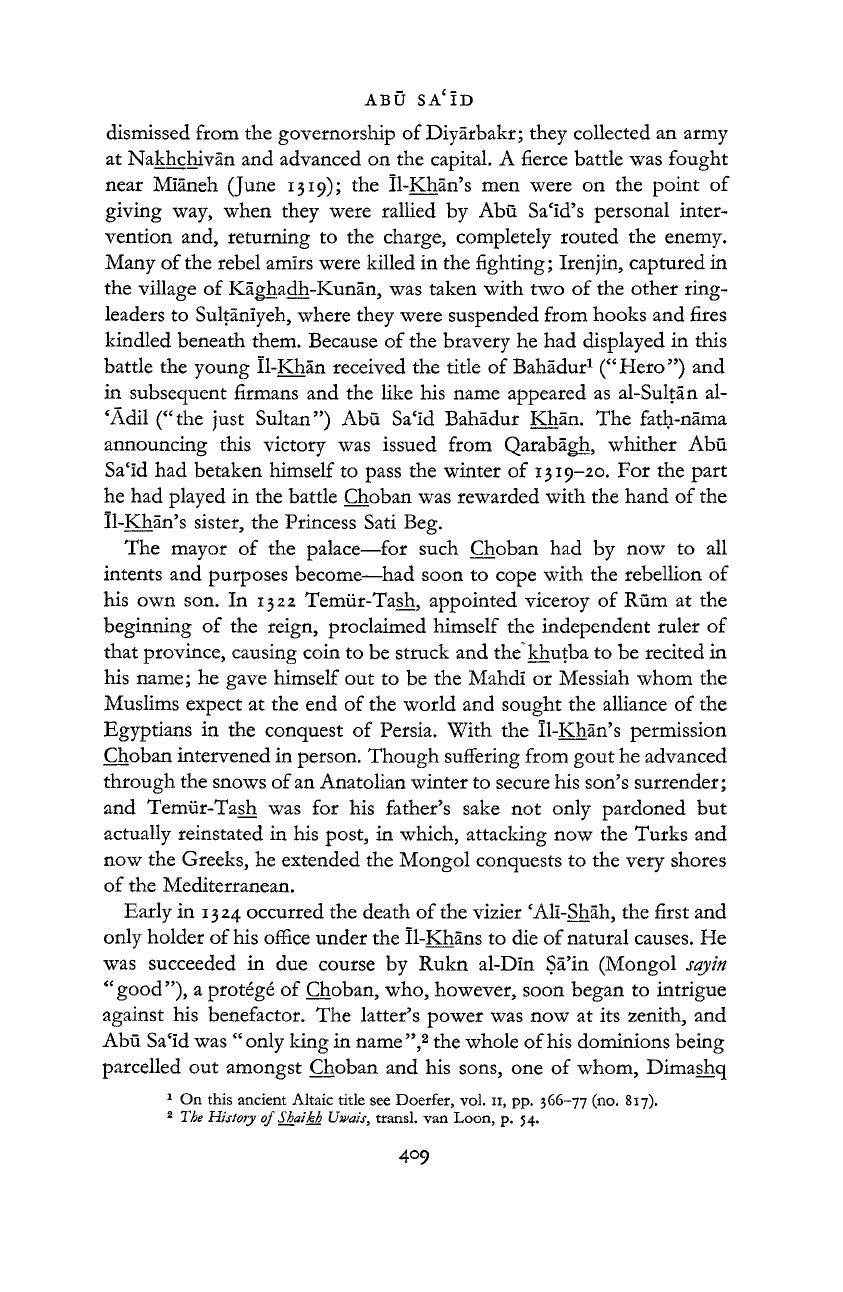
ABU
SA'lD
409
dismissed from the governorship of Diyarbakr; they collected an army
at Na
khchivan and advanced on the capital. A fierce battle was fought
near Mianeh
(June
1319);
the Il-Khan's men were on the point of
giving
way, when they were rallied by Abu Sa'id's personal
inter-
vention and, returning to the charge, completely routed the enemy.
Many of the rebel amirs were killed in the fighting; Irenjin, captured in
the village of Kaghadh-Kunan, was taken with two of the other ring-
leaders to Sultaniyeh, where they were suspended from hooks and fires
kindled beneath them. Because of the bravery he had displayed in this
battle the young Il-Khan received the title of Bahadur
1
("Hero") and
in subsequent firmans and the like his name appeared as al-Sultan al-
'Adil
("the just Sultan") Abu Sa'Id Bahadur Khan. The fath-nama
announcing this victory was issued from Qarabagh, whither Abu
Sa'id
had betaken himself to pass the winter of
1319-20.
For the
part
he had played in the battle Choban was rewarded with the
hand
of the
Il-Khan's sister, the Princess Sati Beg.
The mayor of the palace—for such Choban had by now to all
intents
and purposes become—had soon to cope with the rebellion of
his own son. In 1322 Temur-Tash, appointed viceroy of Rum at the
beginning of the reign, proclaimed himself the independent ruler of
that
province, causing coin to be struck and the khutba to be recited in
his name; he gave himself out to be the Mahdi or Messiah whom the
Muslims expect at the end of the world and sought the alliance of the
Egyptians in the conquest of Persia. With the Il-Khan's permission
Choban intervened in person. Though suffering from gout he advanced
through the snows of an Anatolian winter to secure his son's
surrender;
and Temur-Tash was for his father's sake not only pardoned but
actually reinstated in his post, in which, attacking now the Turks and
now the Greeks, he extended the Mongol conquests to the very shores
of
the Mediterranean.
Early in 1324 occurred the death of the vizier 'Ali-Shah, the first and
only holder of his
office
under
the Il-Khans to die of
natural
causes. He
was
succeeded in due course by Rukn al-Din Sa'in (Mongol
sayin
"good"),
a protege of Choban, who, however, soon began to intrigue
against his benefactor. The latter's power was now at its zenith, and
Abu
Sa'id was " only king in name ",
2
the whole
of
his dominions being
parcelled out amongst Choban and his sons, one of whom, Dimashq
1
On this ancient Altaic title see Doerfer, vol.
11,
pp. 366-77 (no. 817).
2
The History of Shaikh Uwais, transl. van Loon, p. 54.
